Arts & Entertainment
What the Blade means to me
Former employees reflect on impact of the newspaper
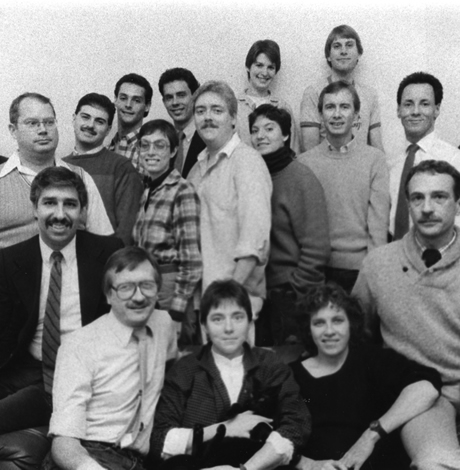
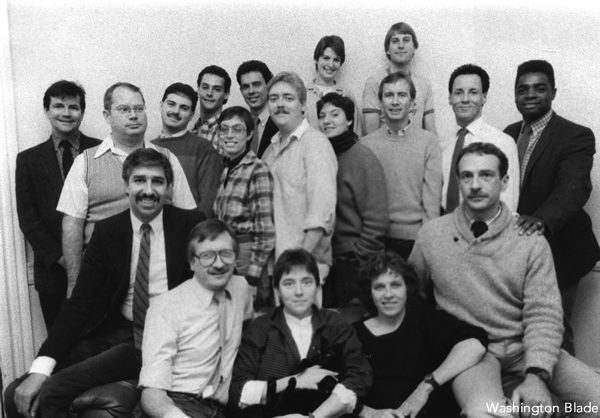
As we wrap our yearlong celebration of the Washington Blade’s 50th anniversary, we wanted to provide space to former employees to reflect on what the newspaper means to them. Here is a sampling of what they had to say. Thanks to everyone for contributing.
JERYL PARADE, Blade account executive, 2009-2016
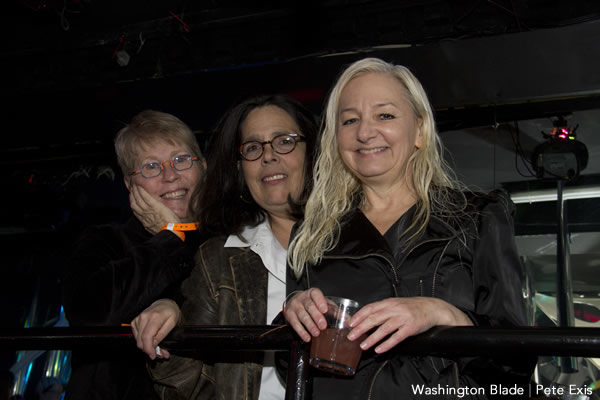
“I need to tell you this is the last issue of the newspaper you will be delivering. It’s not you. It’s us. We’re shutting down.”
“What will you do?”
“Look for a job. But not here. In D.C.
“You should apply at the Blade.”
“The Blade?”
“We’ve been there trying to get their distribution business. You should see the offices. They’re beautiful”.
“Yeah. OK. Thanks for the advice.” But I’m not gay.
On July 26, 2009, I emailed publisher Lynne Brown my three-page resume with 18 bullet points of publishing accomplishments. She responded on July 31, 2009. “Thanks for writing. There are only opportunities in life.”
In a subsequent email we agreed to meet on Wednesday at 11 a.m. Lynne wrote, “We are generally a casual group. So dress to be yourself.”
I did not know if she meant this or was being crafty. Should I really show up in a ‘90s Goth thing? I decided on a business suit. The Blade is, after all, a business.
And then some!
Happily I got the job. It was advertising sales. I had been a manager for 25 years, but when you work with clients, as I had, you are in sales.
I am able to tell on the first day of a new job if it is going to work out. On that first day — even though all I did was read the employee manual — I felt good. I was breathing in fresh air.
The next day I made my first sales call. It resulted in a sale. You know it can take 10 or more calls or emails to connect with someone and five or more contacts with said someone to seal the deal. If you’re lucky. Not so with the Blade. I was batting 1,000 percent!
Still, I was feeling stilted compared to my debonair coworkers. I remember seeing a team photo from the previous holiday season. Everyone dressed in black. I don’t think anyone was smiling. I would never be as cool as that.
About two and a half months into my tenure, on Monday, Nov. 16, 2009, we came in to work and were told (by the then parent company) to go home. Plenty has been written about the days and weeks that followed. I won’t go into that here. I consulted with my father about what to do next. I told him how the employees had a plan to keep publishing. My dad advised me to stay. He said, “It might be better.”
From then on I learned how to work on a commission-only basis and have confidence in my own and our success. I had always worked at a desk, in an office. Now I was free. An advertiser would call me on my cell while I was on the streets of downtown D.C. How cool was I now? I was Blade cool.
One of my most vivid memories of working for the Blade is from 2013 in the Venetian Jewish Ghetto. My friend was on a tour while I was in the piazza taking a call from the Washington Women’s Rugby Football Club (DC Furies) about advertising in our LGBTQ Sports Issue. I had sent an email blast earlier that week from our hotel room in Rome to let everyone know I had previewed the content and it was amazing!
Being “not gay” was never an issue. My advertisers and co-workers did not care which of the letters comprising the acronym I was. I had always assumed it was A for Ally. Now I know. It’s G. For Grateful.
KEN SAIN, Blade news editor, 2003-2005
Perhaps the most important thing we have learned since Stonewall is that visibility is everything. Many of the advances the LGBTQ community has made in these past decades are because ordinary people had the courage to come out.
Each generation has made it easier for the next, and the current one will make it even easier for those who follow. It was far easier in those early years for an Anita Bryant and others to go argue for discrimination when it was just some drag queens no one knew in San Francisco who were denied rights and being assaulted.
It’s a lot harder to make that case when it’s your uncle, or sister, or child.
So yes, give credit to the leaders for inspiring us and willing to be the face that took the criticism. But remember that each of us who had the courage to tell our truth to family and friends and co-workers also did our part to help change public opinion.
And give some credit to the Washington Blade. For 50 years it has been covering the struggle, helping to inspire new generations by telling the stories of those who came before. It was a source of news for our community when others didn’t even acknowledge our issues. The Blade did so while maintaining the highest standards of journalism and ethics.
I know from my time as news editor what a vital role the Blade has in the community. I like to think that by covering the community fairly and with integrity we achieved our goals of informing and in some cases entertaining readers. I also believe that by putting a spotlight on the stories of our community, we helped moved the needle on public opinion in some small way.
I am deeply proud of my time working for the Blade and the work we did. There is something special about working with quality people on a righteous cause. Our cause was to show that we could do great journalism for LGBTQ readers and keep them informed of the issues that that in many cases no one else was covering.
In doing so, we helped make our community more visible. And as we’ve learned during these past 50 years, being more visible is one key to being accepted.
Happy 50th anniversary, Blade.
KRISTINA CAMPBELL, Blade reporter, managing editor and editor, 1992-2002
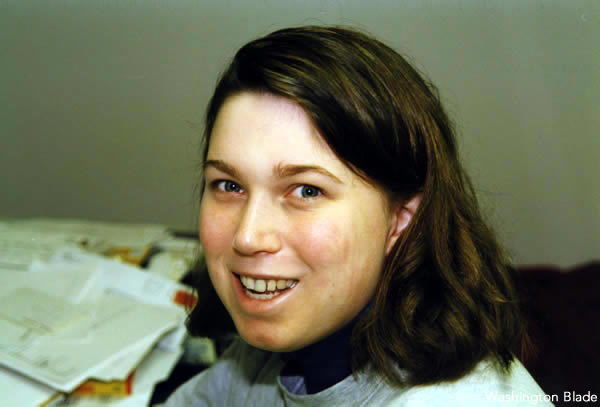
The thing I remember most about the Blade was the company’s elegant balance as a fun and often lighthearted atmosphere that was also a professional workplace where we were serious about our mission and our product. I felt close to everyone in the newsroom, especially as I rose the editor ranks and started supervising people who had been my colleagues. It was an honor to be trusted with that role. I remember the work being challenging but rewarding, every day of my tenure there, until the ownership changed and some workplace issues started clouding my focus on the news. I felt an obligation to the community the entire time I worked at the Blade, because it was so important to get the information correct, to be fair, to create a record for information and developments that the mainstream media was only beginning to cover. And I also felt a responsibility to act with objectivity and to give fair and respectful treatment to adversaries of the community or its civil rights work. That was sometimes difficult, but it made me a better journalist and, I think, a better person.
I grew up in that job, and I had fun doing it. It was an exciting time to cover gay civil rights issues — news was always developing and it felt like we as a community were on the brink of big things. Indeed, the big things gradually took shape. I often think about the current presidential administration and how working at the Blade would be so different now, and likely frustrating, as significant pieces of the progress we covered is at risk of (or in the process of) being rolled back.
The Blade was, I insisted then and maintain now, the most reliable and professional source of hard news about the gay movement anywhere in the world when I worked there, for most of the 90s and into the next decade, And that was quite something to be part of. I always had such deep respect for the people who hired me and shaped me into a professional — Don Michaels and Lisa Keen — because they gave their careers to being the daily historians of a civil rights movement. The same is true for the longest-tenured Blade staffer in history, Lou Chibbaro Jr., whose professionalism and hard-nosed reporting style made each issue of the paper better. I was fond of everyone on the staff, but those three really made that newspaper into an institution I was proud to participate in.
RHONDA SMITH, Blade reporter, features editor, 1997-2005; intern, 1984
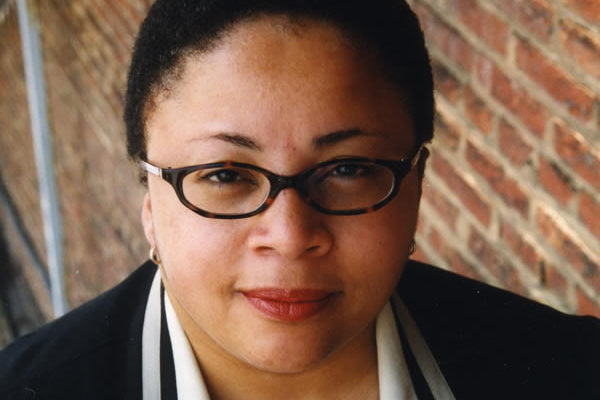
I was a journalism undergraduate at Howard University during the early 1980s when I became an intern at the Washington Blade under the tutelage of Lisa Keen and Don Michaels. At the time, I was just coming out and trying to find my way in the world as the daughter of a Southern Baptist minister and a public school teacher from a small town in Texas. The Blade helped shape a key part of my identity in a way that few others did at that time.
I get nitty-gritty details about the LGBTQ experience from the Blade that other media organizations might still tend to gloss over. Writers and editors at the Blade take a deeper dive on topics that help determine the extent to which we thrive. The Blade reminds me that my sexual orientation is a blessing that should be embraced.
My favorite memory working at the Blade: Watching Lou Chibbaro, Jr. get the story.
BRIAN MOYLAN, Blade intern, reporter and features editor, 2000-2006
Gather round, children and let Grandpa Moylan tell you about the bad old days before marriage equality, Grindr, and RuPaul’s Drag Race. In 2000, during my senior year at George Washington University I was about to graduate and needed a job badly. As an English major with a minor in Thursday College Night at Badlands, I didn’t have many prospects, so I opened up the Washington Blade and faxed my resume to every job listing in the want ads. Don’t worry, kids, if you don’t understand half of the things in the previous sentence.
The only two responses I got from my resume were from the Blade itself and the Crew Club, both of them situated on 14th Street when you were more likely to see a prostitute or a shooting in the area rather than an Aesop. I interviewed at the Blade and, as I was getting dressed to go to my interview at the Crew Club, managing editor Kristina Campbell called and told me I got the job. I decided to ditch the Crew Club and become a journalist instead of a jizz mopper. It was my Gwyneth Paltrow “Sliding Doors” moment.
I was an editorial assistant making $22,000 a year, which was not very much even back then. One of my first responsibilities was to go to the Supreme Court and pick up the rulings for Boy Scouts of America V. Dale, where the court ruled it was perfectly acceptable for private groups to discriminate against gay people. It was a startling setback and I thought, “This is going to be a tough job if the news is always this bad.”
The news, back then was often bad: Iowa’s governor rescinded gay protections already in place, several states banned same-sex adoptions, the Millennium March stiffed its vendors, hate crimes bills got voted down left and right, “Brokeback Mountain” lost to “Crash.” Seriously? Crash?! To make it even worse, Cobalt even burned down. Then George W. Bush was elected and things got even worse as that closet case Ken Mehlman used gay marriage bans to stoke Republican turnout at the polls. Often being at work was painful.
But looking back at my time at the Blade (where I eventually rose to be the features editor before I quit in 2006 to move to New York), I don’t remember all of that awful news. Most of all what I remember is the amazing people I worked with, especially Campbell, Lyn Stoessen, and Will O’Bryan, the patient lesbians who taught me how to be a journalist. (Don’t worry, Will always self-identified as a lesbian.) And of course I think of Kevin Naff, still running the gay paper of record, and Lou Chibbaro Jr., the best reporter I have ever encountered in 20 years in journalism. (I also think of the one coworker I slept with, but we should probably not be naming names.)
Secondly, what I remember are all of the amazing events I covered. As an editorial assistant I had to go to a gay community meeting every week and report on it. I met gay SCUBA divers, Black and White Men Together, gay gun enthusiasts, Log Cabin Republicans, and gay affinity groups for every religion you could possibly imagine, including gay atheists. I think of every High Heel Race, all of the Black Prides, each of Ed Bailey’s amazing Madonnaramas at Velvet Nation, all the gay cowboys at the Atlantic Stampede, every film I reviewed at the Reel Affirmations film festival (even the wretched musical based on Matthew Shepherd’s murder).
The Blade ushered a 21-year-old kid from a small town in Connecticut into a gay community far more vibrant than he ever could have imagined. It taught me that no matter how bad things got or how slowly progress came, that we always had each other, that there was always a reason to celebrate, and another Halloween was just around the corner.
By and large many of the things we were fighting for back in the early 2000s — marriage equality, the end of the gay military ban, outing Ken Mehlman — have come to pass. Gay news these days is much sunnier and is covered by every outlet from Vice to the New York Times. But that doesn’t mean that the Blade is obsolete. The one thing it will always have going for it is that it is of the community and by the community. No one else had the dedication or support to make it through 50 years of the bad old times. I couldn’t be more proud to be a part of that legacy. Back in 2000, the Blade gave me a job and since then it has given me a career in media. But the most important thing it gave me, that it still gives me, is hope.
PHILIP VAN SLOOTEN, Blade intern, 2019
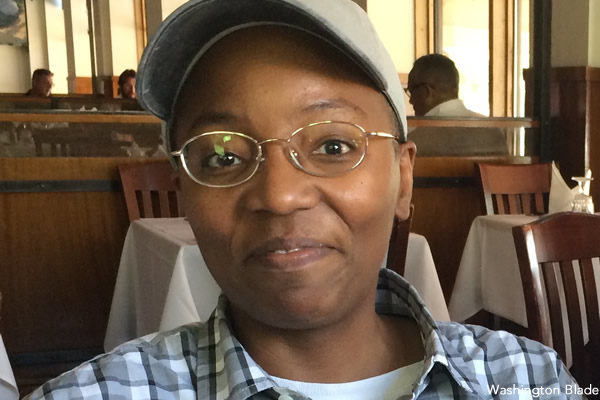
It’s important for the LGBTQ community and our issues to be treated respectfully and normalized in the same manner that mainstream media does for the cisgender-heterosexual community. The Blade takes our lives and opinions on all topics seriously and not just as “quirky” news. For example, the Blade would interview a drag performer about their political views and that becomes the news whereas the news for the straight press is simply that someone performs in drag. Their level of education or insights aren’t of interest.
I’ve read a few other LGBTQ publications in the region and very few strive to elevate LGBTQ discourse beyond the sensational.
Books
Love or fear flying you’ll devour ‘Why Fly’
New book chronicles a lifetime obsession with aircraft

‘Why Fly’
By Caroline Paul
c. 2026, Bloomsbury
$27.99/256 pages
Tray table folded up.
Check. Your seat is in the upright position, the airflow above your head is just the way you like it, and you’re ready to go. The flight crew is making final preparations. The lights are off and the plane is backing up. All you need now is “Why Fly” by Caroline Paul, and buckle up.

When she was very young, Paul was “obsessed” with tales of adventure, devouring accounts written by men of their derring-do. The only female adventure-seeker she knew about then was Amelia Earhart; later, she learned of other adventuresome women, including aviatrix Bessie Coleman, and Paul was transfixed.
Time passed; Paul grew up to create a life of adventure all her own.
Then, the year her marriage started to fracture, she switched her obsession from general exploits to flight.
Specifically, Paul loves experimental aircraft, some of which, like her “trike,” can be made from a kit at home. Others, like Woodstock, her beloved yellow gyrocopter, are major purchases that operate under different FAA rules. All flying has rules, she says, even if it seems like it should be as freewheeling as the birds it mimics.
She loves the pre-flight checklist, which is pure anticipation as well as a series of safety measures; if only a relationship had the same ritual. Paul loves her hangar, as a place of comfort and for flight in all senses of the word. She enjoys thinking about historic tales of flying, going back before the Wright Brothers, and including a man who went aloft on a lawn chair via helium-filled weather balloons.
The mere idea that she can fly any time is like a gift to Paul.
She knows a lot of people are terrified of flying, but it’s near totally safe: generally, there’s a one in almost 14 million chance of perishing in a commercial airline disaster – although, to Paul’s embarrassment and her dismay, it’s possible that both the smallest planes and the grandest loves might crash.
If you’re a fan of flying, you know what to do here. If you fear it, pry your fingernails off the armrests, take a deep breath, and head to the shelves. “Why Fly” might help you change your mind.
It’s not just that author Caroline Paul enjoys being airborne, and she tells you. It’s not that she’s honest in her explanations of being in love and being aloft. It’s the meditative aura you’ll get as you’re reading this book that makes it so appealing, despite the sometimes technical information that may flummox you between the Zen-ness. It’s not overwhelming; it mixes well with the history Paul includes, biographies, the science, heartbreak, and exciting tales of adventure and risk, but it’s there. Readers and romantics who love the outdoors, can’t resist a good mountain, and crave activity won’t mind it, though, not at all.
If you own a plane – or want to – you’ll want this book, too. It’s a great waiting-at-the-airport tale, or a tuck-in-your-suitcase-for-later read. Find “Why Fly” and you’ll see that it’s an upright kind of book.
The Blade may receive commissions from qualifying purchases made via this post.
Theater
Out actor Kevin Cahoon on starring role in ‘Chez Joey’
Arena production adapted from Broadway classic ‘Pal Joey’

‘Chez Joey’
Through March 15
Arena Stage
1101 Sixth St., S.W.
Tickets start at $93
Arenastage.org
As Melvin Snyder in the new musical “Chez Joey,” out actor Kevin Cahoon plays a showbiz society columnist who goes by the name Mrs. Knickerbocker. He functions as a sort of liaison between café society and Chicago’s Black jazz scene circa 1940s. It’s a fun part replete with varied insights, music, and dance.
“Chez Joey” is adapted from the Broadway classic “Pal Joey” by Richard Rodgers and Lorenz Hart. It’s inspired by John O’Hara’s stories based on the exploits of a small-time nightclub singer published in The New Yorker.
A warm and humorous man, Cahoon loves his work. At just six, he began his career as a rodeo clown in Houston. He won the Star Search teen division at 13 singing songs like “Some People” from “Gypsy.” He studied theater at New York University and soon after graduating set to work playing sidekicks and comedic roles.
Over the years, Cahoon has played numerous queer parts in stage productions including “Hedwig and the Angry Inch,” “La Cage aux Folles,” “Rocky Horror” as well as Peanut in “Shucked,” and George the keyboardist in “The Wedding Singer,” “a sort of unicorn of its time,” says Cahoon.
Co-directed by Tony Goldwyn and the great Savion Glover, “Chez Joey” is a terrific and fun show filled with loads of talent. Its relevant new book is by Richard Lagravenese.
On a recent Monday off from work, Cahoon shared some thoughts on past and current happenings.
WASHINGTON BLADE: Is there a through line from Kevin, the six-year-old rodeo clown, to who we see now at Arena Stage?
KEVIN CAHOON: Anytime I want to land a joke in a theater piece it goes back to that rodeo clown. It doesn’t matter if it’s Arena’s intimate Kreeger Theatre or the big rodeo at the huge Houston Astrodome.
I was in the middle stadium and there was an announcer — a scene partner really. And we were doing a back and forth in hopes of getting laughs. At that young age I was trying to understand what it takes to get laughs. It’s all about timing. Every line.
BLADE: Originally, your part in “Chez Joey” Melvin was Melba who sings “Zip,” a clever woman reporter’s song. It was sort of a star feature, where they could just pop in a star in the run of “Pal Joey.”
CAHOON: That’s right. And in former versions it was played by Martha Plimpton and before her Elaine Stritch. For “Chez Joey,” we switched gender and storyline.
We attempted to do “Zip” up until two days before we had an audience at Arena. Unexpectedly they cut “Zip” and replaced it with a fun number called “I Like to Recognize the Tune,” a song more connected to the story.
BLADE: Wow. You must be a quick study.
CAHOON: Well, we’re working with a great band.
BLADE: You’ve played a lot of queer parts. Any thoughts on queer representation?
CAHOON: Oh yes, definitely. And I’ve been very lucky that I’ve had the chance to portray these characters and introduce them to the rest of the world. I feel honored.
After originating Edna, the hyena on Broadway in “The Lion King,” I left that to do “Hedwig and the Angry Inch” as standby for John Cameron Mitchell, doing one show a week for him.
Everyone thought I was crazy to leave the biggest musical of our time with a personal contract and getting paid more money that I’d ever made to get $400 a week at the downtown Jane Street Theatre in a dicey neighborhood.
At the time, I really felt like I was with cool kids. I guess I was. And I never regretted it.
BLADE: When you play new parts, do you create new backstories for the role?
CAHOON: Every single time! For Melvin, I suggested a line about chorus boys on Lakeshore Drive.
BLADE: What’s up next for Kevin Cahoon?
CAHOON: I’m about to do the New York Theatre Workshop Gala; I’ve been doing it for nine years in a row. It’s a huge job. I’ll also be producing the “Cats: The Jellicle Ball” opening on Broadway this spring; it’s a queer-centric uptown vogue ball with gay actor André de Shields reprising his role as “Old Deuteronomy.”
BLADE: There’s a huge amount of talent onstage in “Chez Joey.”
CAHOON: There is. I’m sharing a dressing room with Myles Frost who plays Joey. He won accolades for playing Michael Jackson on Broadway. We’ve become great friends. He’s a miracle to watch on stage. And Awa [Sal Secka], a D.C. local, is great. Every night the audience falls head over heels for her. When this show goes to New York, Awa will, no doubt, be a giant star.
BLADE: Do you think “Chez Joey” might be Broadway bound?
CAHOON: I have a good feeling it is. I’ve done shows out of town that have high hopes and pedigree, but don’t necessarily make it. “Chez Joey” is a small production, it’s funny, and audiences seem to love it.

The Capital Pride Alliance held the annual Pride Reveal event at The Schuyler at The Hamilton Hotel on Thursday, Feb. 26. The theme for this year’s Capital Pride was announced: “Exist. Resist. Have the audacity!”
(Washington Blade photos by Michael Key)























-

 India4 days ago
India4 days agoActivists push for better counting of transgender Indians in 2026 Census
-

 Advice4 days ago
Advice4 days agoDry January has isolated me from my friends
-

 District of Columbia4 days ago
District of Columbia4 days agoCapital Pride reveals 2026 theme
-

 National4 days ago
National4 days agoAfter layoffs at Advocate, parent company acquires ‘Them’ from Conde Nast




















